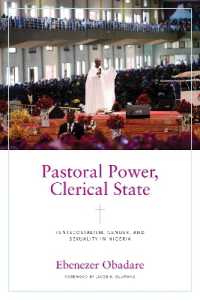- ホーム
- > 洋書
- > 英文書
- > Politics / International Relations
Full Description
Constructivism, despite being one of the three main streams of IR theory, along with realism and liberalism, is rarely, if ever, tested in large-n quantitative work. Constructivists almost unanimously eschew quantitative approaches, assuming that variables of interest to constructivists, defy quantification. Quantitative scholars mostly ignore constructivist variables as too fuzzy and vague. And the rare instances in which quantitative scholars have operationalized identity as a variable, they have unfortunately realized all the constructivists' worst fears about reducing national identity to a single measure, such as language, religion, or ethnicity, thereby violating one of the foundational assumptions of constructivism: intersubjectivity.
Making Identity Count presents a new method for the recovery of national identity, applies the method in 9 country cases, and draws conclusions from the empirical evidence for hegemonic transitions and a variety of quantitative theories of identity. Ted Hopf and Bentley B. Allan make the constructivist variable of national identity a valid measure that can be used by large-n International Relations scholars in a variety of ways. They lay out what is wrong with how identity has been conceptualized, operationalized and measured in quantitative IR so far and specify a methodological approach that allows scholars to recover the predominant national identities of states in a more valid and systematic fashion. The book includes "national identity reports" on China, the US, UK, Germany, France, Brazil, Japan, and India to both test the authors' method and demonstrate the promise of the approach. Hopf and Allan use these data to test a constructivist hypothesis about the future of Western neoliberal democratic hegemony. Finally, the book concludes with an assessment of the method, including areas of possible improvement, as well as a description of what an intersubjective national identity data base of great powers from 1810-2010 could mean for IR scholarship.
Contents
Chapter One
Making It Count: Constructivism, Identity, and IR Theory, Ted Hopf
Chapter Two
Recovering Discourses of National Identity, Bentley Allan
Chapter Three
'The Rascal's Paradise:' Brazilian National Identity in 2010, Marina Duque
Chapter Four 'Development' as a means to an unknown end: Chinese National Identity in 2010, Liang Ce and Rachel Zeng Rui
Chapter Five
Whither La France? French National Identity in 2010, Benjamin Chan Jian Ming and Rebecca Oh
Chapter Six
The Politics of Responsibility: Germany National Identity in 2010, Kai Lim Heng
Chapter Seven
Talented Democrats in a Modern State: Indian Identity 2010, (English), Jarrod Hayes
Chapter Eight
India's Choice: Western or Asian Global Liberal Hegemony? Indian Identity 2010 (Hindi), Shivaji Kumar
Chapter Nine
Conflicted Identities: Japanese National Identity 2010, Nanaho Hanada
Chapter Ten
'The Only Friend the US Has in the Western World:' UK National Identity in 2010, Srdjan Vucetic
Chapter Eleven
The Country upon a Hill? American Identity in 2010, Ki Hoon Michael Hor
Chapter Twelve
"Making Identity Count:" Looking Beyond IR, Srdjan Vucetic
Chapter Thirteen
What Have We Learned, Ted Hopf and Bentley Allan
Appendix
National Identity Report Code Book








